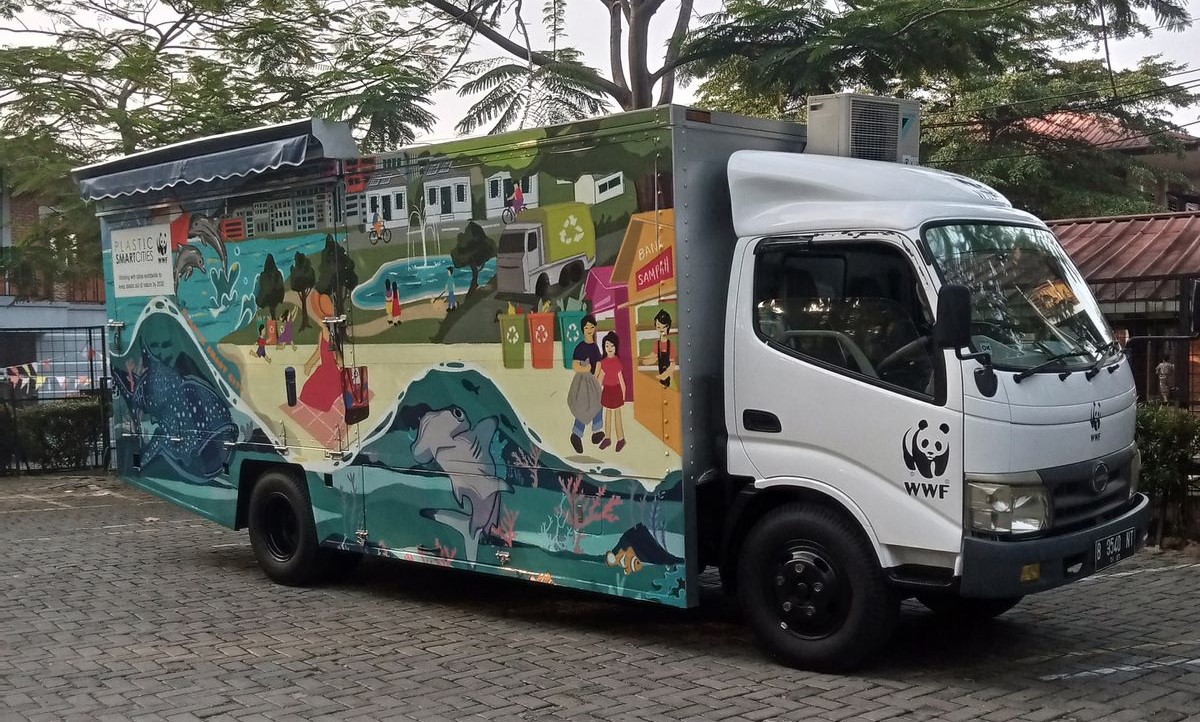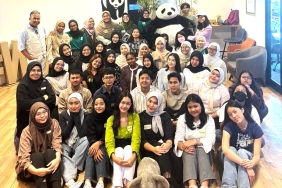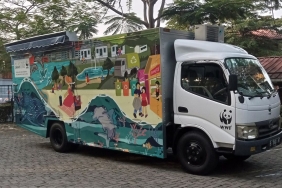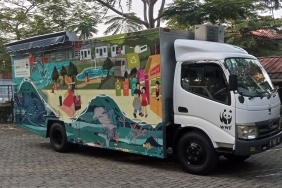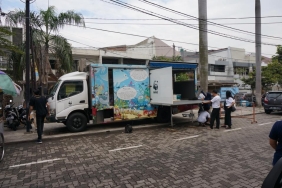WATER EDUCATION LAB AT PANDA MOBILE
By: Luthfy Abdillah (Volunteer Panda Mobile) and Natalia Trita Agnika
The Panda Mobile truck is one of the conservation messaging media owned by WWF-Indonesia. So far, the Panda Mobile truck has always attracted attention because it is decorated with various images of protected animals. The back cabin can also be transformed into a multifunctional stage, library, and a place to watch movies about the environment. Now, the public can also learn about water through a mini laboratory available on the Panda Mobile truck, as done by children from Cakung Children Community last Saturday (06/08).< br />
Together with Lecreatte, WWF-Indonesia's Panda Mobile team provided education about water pollution in the Joy of Children activity. The theme was chosen because the Cakung area is known as an area that has problems with water pollution. The educational activity took place in the morning in one of the residents' house yards surrounded by unkempt rice fields and near a factory.
Pratama Aditya as the Panda Mobile Coordinator started the activity by dividing two groups consisting of a male group and a female group. On that day, the Panda Mobile team created two educational posts. In the first post, the children were invited to walk around the activity site to see the condition of their neighborhood. This aims to make them realize that the condition of the environment where they live has been polluted by garbage and factory waste. While looking at the condition of the surrounding environment, the facilitators advised the children not to play or swim in the polluted water puddles in the area because it would have an impact on their health.< br />
To find out about water pollution, they checked the water quality directly in the mini laboratory owned by Panda Mobile. This activity is an activity in post two. The mini laboratory includes a set of microscopes that can be connected to a monitor screen, a ph meter, litmus paper, and an electrolysis device. Even though the Panda Mobile team arrived without a truck, the lab could still be used because it is mobile. After making observations, the facilitators taught about the characteristics of clean water that can be consumed and how to protect the environment. At the end of the event, the children gained knowledge about the water cycle through a story told by Kak Ryan and Kak Biyong from Panda Mobile.
A similar activity was also held the following day, Sunday (07/08) in Cilincing, North Jakarta. Still working with Lecreatte, Panda Mobile provided education about water and the environment at a church in the Cilincing area, North Jakarta. Unlike the activities in Cakung, the children in the Cilincing area were invited to make observations on the beach around the location of the activity.
The condition of the beach is not well maintained and a bad smell arises due to the large amount of garbage and becomes a location for shell disposal. While looking at the condition, the children were given an explanation about environmental pollution and its impact on living things around the polluted location. They also watched a video showing the condition of the environment that is starting and has been polluted, as well as the impacts that arise for living things around it.
The rare opportunity to see water quality through a microscope made the participants very enthusiastic. Especially when they could see the various bacteria contained in the water through the monitor screen connected to the microscope. The sample water taken came from a ditch near the location of the activity. Various expressions were seen on the faces of the participants. Most of them were surprised because it was the first time they saw the shape of bacteria in water.
From the two activities carried out in two different locations, most of the children were already aware that their environment was dirty and polluted. However, because there are no role models and guidance, they do not know what they should do to improve the condition of the environment around them. Hopefully, the presence of Panda Mobile will be able to bring them to become agents of change for a better environment.

